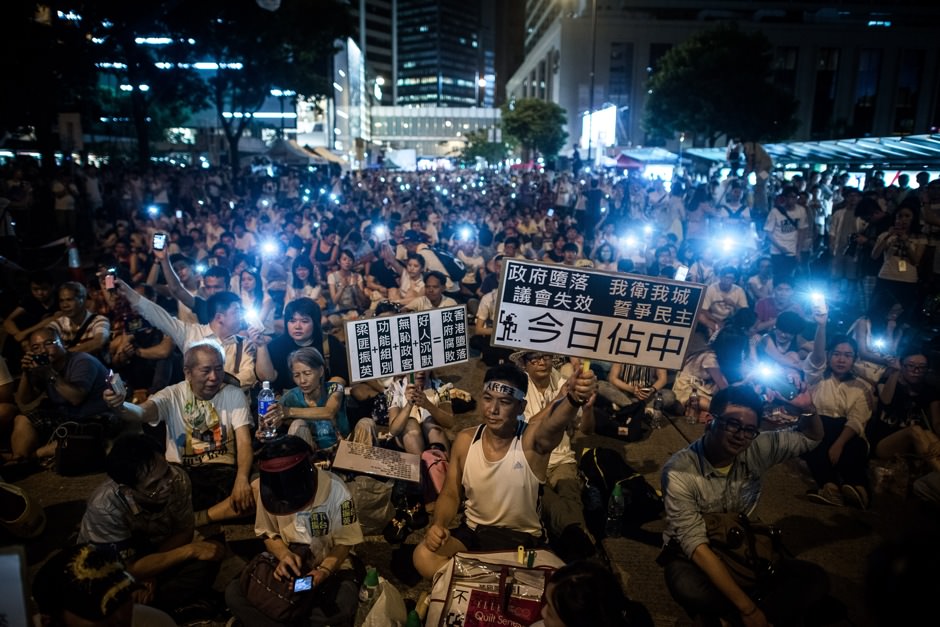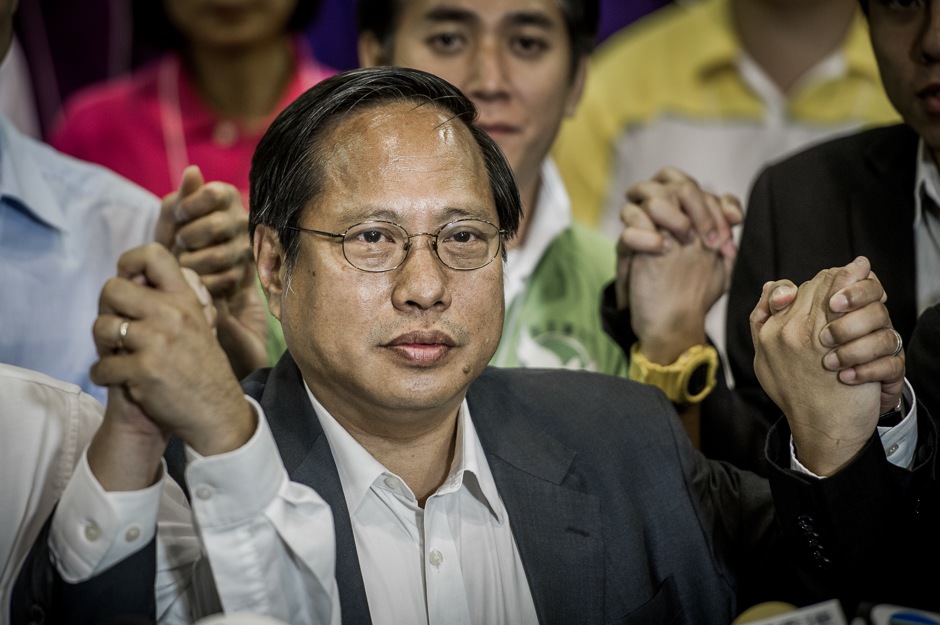The former British colony of Hong Kong reverted to China on July 1, 1997, and on every July 1 since then Hong Kong citizens have marched in the streets asking for democracy. The demonstrations on this year’s anniversary, however, were on a much larger scale. According to the police, they drew nearly one hundred thousand people; the movement’s organizers estimate that as many as a half million people took part. The protests were not violent, and there were no clashes with the security forces who were closely monitoring the crowd. As part of the protest, in the early morning of July 2 about one thousand people sat down in Hong Kong’s central district in a disciplined exercise of civil disobedience.
More than five hundred participants in the sit-in were arrested on suspicion of organizing illegal public gatherings and incitement. Among them was Albert Ho, a member of Hong Kong’s Legislative Council and chair of the Hong Kong Democratic Party from 2006 to 2012, who was detained along with two other members of the Legislative Council and eight student leaders and held for nine hours at a police training school. Following is an edited version of interview with Ho about the protests and the future of Hong Kong, conducted over the Internet in the days after his release from detention on July 2.
Perry Link: Hong Kong has a long tradition of protests. In 2003 hundreds of thousands of people protested the imposition of the “Article 23” anti-subversion law, which would have curtailed freedom of speech and the press in Hong Kong. And in 2012 there were large protests over government efforts to require pro-Beijing “patriotic” education in schools. But the crowds this summer seem more determined. Has something changed?
Albert Ho: Yes, the July First protest this year was importantly different. Those earlier protests might be described as struggles for freedom from something—freedom from censorship or freedom from brainwashing of our children. The protest a few days ago was a demand for something: the people want free elections in order to take charge of their own house. The June Fourth commemorations are largely dedicated to the cause of democracy in mainland China. The July First demonstration was for us, right here.
Could you say more about “taking charge of your own house”? What exactly do the people of Hong Kong want?
Most people in Hong Kong, especially the young, have become increasingly dissatisfied with the performance of our Beijing-chosen chief executives—especially the present one, Mr. C. Y. Leung [a candidate chosen by a Beijing-backed election committee in 2012]. People do not see these executives as putting the interests of Hong Kong people first; their top priorities have been the interests of Beijing and of big business. The widening gap between rich and poor, the spike in property prices and rents, and the increased domination of local markets by big businesses have been dispiriting and have led young people to feel they do not have a fair chance at a good career and a bright future. Some of them are so frustrated that they have become radicalized and look for every opportunity to vent anger at the government and the whole establishment. They may not know exactly what they want, but they know they feel powerless now, and don’t like that. They see universal suffrage as perhaps the only way out, their only chance for political equality as citizens.
Why is this happening now?
The passion comes from a determination that Beijing honor its promise to implement universal suffrage in the election of Hong Kong’s chief executive in 2017. Hong Kong’s people have been striving for democracy for over two decades, and the desire is now so strong that if Beijing breaches its promise and fails to deliver democracy in 2017, Hong Kong will likely become—to borrow a word from the current president of the Legislative Council, who is a veteran politician and is pro-Beijing—“ungovernable.”
Another source of the passion is the growing interference from the mainland in the domestic affairs of Hong Kong. A white paper on Hong Kong that was recently released by Beijing has aroused widespread concern and even antagonism for making clear that Beijing intends to assert its “sovereign prerogative” to impose tighter control over local Hong Kong affairs—including, notably, the requirement that judges show fealty to Beijing.
The two points are related. The people of Hong Kong feel that only a democratically elected chief executive can have the integrity and courage to stand firm in defense of their basic rights and interests under the “one country, two systems” system that Beijing has promised. They feel this is the only way to resist undue interference from the mainland. In marching for democracy, the protesters were also marching against Beijing’s policy of assimilating Hong Kong.
Advertisement
How did Beijing’s promise of universal suffrage come about, and what does it actually say?
In the 1980s, in preparation for the handover of Hong Kong from Britain to China in 1997, London and Beijing negotiated an agreement that was formally passed in Beijing in 1990 as the “Basic Law of the Hong Kong Special Administrative Region.” This law states (in articles 45 and 58) that the ultimate goal of Hong Kong’s political development is universal suffrage, and it includes a timetable for the partial democratization of the city’s Legislative Council during the first ten years after 1997. But the pace of development after that was left open. When 2007 arrived, the Standing Committee of the National People’s Congress (NPC) in Beijing promulgated another timetable, and this one provided for universal suffrage in the election of Hong Kong’s chief executive in 2017 and in the election of all legislators in 2020.
The controversial point at present is what “universal suffrage” means. Does it mean voters may nominate their own candidates, which is the accepted international standard in real democracies? Or only that they may choose among candidates hand-picked by Beijing? The people of Hong Kong say the former, and Beijing—so far, anyway—seems to mean the latter. Beijing is obliged by its own rules to take a formal position on this question between now and September. People here will be watching closely.
The protesters have been rejecting Beijing’s call that Hong Kong people be “patriotic.” Why? What kind of relation to their government and nation would they prefer?
The young protesters reject Beijing-sponsored “patriotism” for several reasons. First, they see it as loyalty not to a nation or country but to an authoritarian regime that serves the interests of a power elite. For many, the word “China” has become a synonym for the Communist Party of China, and they are not interested in patriotism toward that China. Nor do they feel pride in being part of a “rising China,” because its poor human rights record makes it, in the eyes of the world, something less than a modern civilized country.
In recent years, many young people would rather be seen as “Hongkongers” than as Chinese, and, beyond that, would like to keep Hong Kong itself as separate as possible from the mainland. Many of them are strongly opposed to the government’s policies of social and economic integration with the mainland. They feel resentment toward mainland immigrants, whom they see as the front edge of a long-term settlement policy, and sometimes feel particular resentment toward the children of the elite in China, who come to take places from them at Hong Kong’s universities.
Why do you think Beijing is so worried about democracy in Hong Kong?
The worry is obvious, and I think there are two main reasons for it. First, Beijing worries about losing control of Hong Kong itself. Beijing cannot accept the risk of having a chief executive in Hong Kong whom it does not trust or who might be influenced by the outside world, and a democratic election based on universal suffrage might well give them that kind of chief executive. This is why Beijing insists that candidates be vetted by a “nomination committee” that Beijing controls.
The second reason for the worry has to do with the rest of China. Hong Kong is only a tiny part of China, but the leaders in Beijing are obviously very apprehensive that the Hong Kong model might infect the rest of the country. They have been willing to tolerate Hong Kong as a free economic zone but do not want it to be seen as a free political zone that offers a democratic example to be followed elsewhere. Beijing might come to realize, eventually, that China is reaching a crossroads and that political reform can no longer be avoided. But if and when that happens, they will want the change to come slowly and under their close scrutiny. They will not want an out-of-control Hong Kong leading the way. Hong Kong might spark a revolution inside China.
Four major accounting firms in Hong Kong recently bought newspaper advertisements opposing pro-democracy activity. Big business in Hong Kong has been allied with Beijing for some time, but is the connection getting tighter now?
Beijing’s political and economic operations in Hong Kong have always been mutually reinforcing. A large invisible hand serves the economic interests of big business at the same time as it seeks to design Hong Kong’s political future; many businesses, in return, support Beijing’s political goals. Companies that do business in the mainland have to be careful not to offend the Chinese government, or even the Hong Kong government. In recent years, Hong Kong tycoons friendly to Beijing have acquired ownership of most of the local public media organizations, both print and electronic, and have self-censored in order to appease Beijing. Some have gone even further, apparently seeking to undermine the few pro-democracy media that remain. Recently some big businesses and banks decided, almost simultaneously, to withdraw their advertising contracts from the only major pro-democracy news organization, the Apple Daily. It is quite plain that Beijing has been unscrupulous in recent weeks in exerting both political and economic pressure on businesses, local and foreign alike, to show a united front against the democrats and their protests. The capitulation of the Big Four accounting firms that you cite is only part of a much bigger picture.
Advertisement
What do you think will happen next in the stand-off between Beijing and the protesters? How likely is it that a large scale sit-in, called “Occupy Central,” that has been planned for the heart of Hong Kong will take place?
In late August, the Chinese government is set to announce a formal decision, at least in outline, on the question of Hong Kong elections. At present it seems likely that the decision will be that popular nomination of candidates is contrary to the Basic Law, in which only a “nomination committee” is mentioned. If this is the decision, there will likely be protests in the streets of Hong Kong. If, on the other hand, the decision does not categorically rule out a reform model that meets international standards, then I think a full-scale Occupy Central action can be averted. In that case, political pressure will continue to mount toward the end of 2014, when the Hong Kong authorities (speaking for the Beijing authorities) are obliged to present a political reform proposal to the Hong Kong Legislative Council. If that proposal is liberal enough to allow a nomination system that meets international standards, the pro-democracy parties in Hong Kong will seek public approval of it by offering it to voters in an electronic referendum. So the next three to six months are going to be crucial for the political future of Hong Kong.




